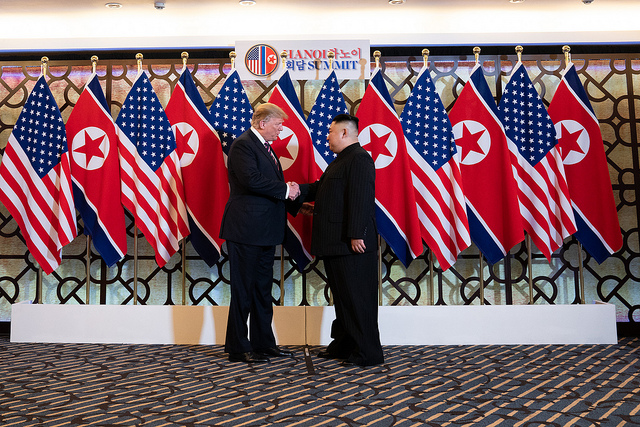The Hanoi and Singapore summits: establishing the terms of engagement
Posted By Ron Huisken on March 15, 2019 @ 11:00

The footage of Donald Trump announcing that he had decided to walk away from his talks with Kim Jong-un in Hanoi without any joint declaration showed the president as quite composed, seemingly comfortable with his decision.
There are still a lot of gaps in what we know about what transpired in Hanoi but, broadly speaking, it appears that the US president finally accepted that, alongside a rapport with the North Korean leader, the US needed to be far more thoroughly prepared for these meetings. He therefore wisely elected to fly home empty-handed.
For a few weeks after Trump agreed to meet Kim, the US entertained the dream of a hole-in-one outcome. In this scenario, the DPRK had determined that being a nuclear-weapon state was not in its long-term interests but that it had succeeded in creating a situation that would result in it being handsomely rewarded for dismantling its nuclear capability.
With a cooperative DPRK, the US envisaged swiftly disabling this capability before progressively eliminating it more thoroughly. Some people, including Trump’s new national security adviser, John Bolton, called this the Libyan solution because something along these lines had occurred in Colonel Gaddafi’s Libya in 2003–04. The Trump administration was forced to concede ahead of the Singapore summit that the process in the DPRK would take a different and yet-to-be-determined path.
Similarly, it now seems clear that the DPRK didn’t see either of the summit meetings as an opportunity to begin the painstaking bargaining to fulfill the joint commitment to denuclearise the Korean peninsula. To the contrary, both summits were approached as opportunities to feel the other side out and seek to position the DPRK as favourably as possible for the ensuing substantive negotiations.
Starting in the lead-up to the Singapore summit, the DPRK sought to confirm the US as the clear aggressor on the Korean peninsula since the late 1940s and with a correspondingly massive ‘trust deficit’ to make up before the DPRK could reasonably be expected to enter into substantive negotiations and binding outcomes on its nuclear capabilities and related issues. Kim targeted US/UN sanctions and signalled that if Washington wanted to persuade him that it was ‘safe’ to do business with the Americans they should relax the sanctions. To reinforce the message, Kim had reinvented himself during 2018 as a leader concerned exclusively with lifting the living standards of his people.
What was so special about the UN/US sanctions? Two aspects of them seem particularly relevant. First, for the US, progressively stronger and sharper sanctions had been the primary instrument of protesting and seeking to deter the DPRK’s accelerated push towards a viable nuclear arsenal. Seen from Pyongyang, however, sanctions connoted punishment for bad behaviour or engaging in illicit activities. This was the attribute of sanctions that Kim could not accept. He wasn’t going to commit to denuking when the other side—and third parties—viewed him as some kind of international criminal driven in from the cold by economic deprivation.
A second, more prosaic, consideration is the likelihood, at some point, of the DPRK really wanting to play for time—and the severity of the sanctions making that a particularly costly option and therefore less plausible as a threat.
Put another way, in Pyongyang’s eyes, the prominence attributed to the sanctions regime in creating the opportunity for a political solution conceded the moral high ground to the United States. Eliminating, or at least sharply diminishing, the prominence of sanctions in the mix of issues in play therefore became the DPRK’s core objective at both summits.
Moreover, as with the US and the ‘Libyan solution’, the DPRK misread Trump’s eagerness to declare a success and ultimately ran with a limited package of capabilities that would be verifiably dismantled in return for a substantial rollback of sanctions. Trump rejected this out of hand and recognised that the bargaining had run its course.
It won’t be easy to find a way around this issue. Will the DPRK remain committed to denuclearisation even if its preferred point of entry into the process has been blocked off? The indications since Hanoi have not been promising. It gets back to the lack of preparation, particularly by the Trump administration, but actually by most US administrations of recent decades.
The DPRK started the Korean War in 1950—an act of aggression endorsed and supported by the Soviet Union and China—and subsequently sustained a harshly belligerent posture towards the US and South Korea while trumpeting the narrative that it was the victim of invasion in 1950 and had since endured the constant prospect of renewed aggression. These harsh realities ‘explained’ the draconian domestic constraints, the extraordinary expansion of the DPRK’s armed forces after the Korean War—to an economically crushing 1.1 million, with massive rocket and artillery capabilities deployed provocatively within range of Seoul—and, ultimately, the drive to acquire nuclear weapons. Moscow and Beijing have done little or nothing over the past 70 years to shift the mentality of the DPRK leadership towards some semblance of normality, and the US has allowed them to get away with it.
So now we have the third generation of a brutal family dictatorship at the head of a huge army and an arsenal of nuclear-tipped ballistic missiles insisting that the world owes them, big time. Trump might start with his pals—Vladimir Putin and Xi Jinping—and suggest that Pyongyang needs to hear a new, and unanimous, narrative to the effect that the security of the DPRK is robust rather than fragile; that these three countries are determined, collectively, to protect this state of affairs; and that, in these circumstances, they expect the DPRK to denuclearise expeditiously and focus its full energies on economic development.
Article printed from The Strategist: https://www.aspistrategist.org.au
URL to article: https://www.aspistrategist.org.au/the-hanoi-and-singapore-summits-establishing-the-terms-of-engagement/
Click here to print.